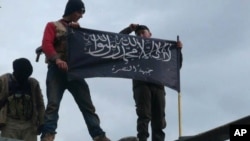The cellphone video obtained by opposition activists of the execution of a Syrian woman accused of adultery is heartbreaking. Made to kneel as she protests her innocence in front of a gathering crowd of masked armed fighters and curious onlookers in a public square, her executioners then announce her crime and one of them steps forward and kills her with a single fatal shot to the head.
Cries of Allahu Akbar greeted the slaying earlier this month, ordered by a religious court in the northwestern Syrian town of Idlib. Behind the body, the name of the group responsible for the execution can be seen scrawled on a wall - Jabhat al-Nusra.
The British-based Syrian Observatory for Human Rights, a monitoring group that gathers information from activists inside Syria, claimed the grisly videos that showed ritualistic and barbaric executions were not limited to the infamous self-styled Islamic State group, or ISIS (Islamic State).
Not so long ago al-Qaida’s affiliate in Syria sought to distinguish itself from breakaway rival ISIS, by enforcing its version of Sharia law on Sunni Muslims in its domain more leniently than the violent enforcement by the competing jihadists of their rules.
But that is beginning to change, say activists and rebel militiamen in the war-torn provinces of Idlib and Aleppo.
In 2013 and most of last year in the city of Aleppo, half of which is controlled by various armed rebel factions, Jabhat al-Nusra, the al-Qaida affiliate appeared eager to broaden its appeal to local Sunni Muslims.
This contrasted with its treatment of foes. The group has been accused of conducting massacres of Christians and members of the Alawite sect of Shia Islam, including slitting throats of its victims. With Sunni Muslims, the group’s fighters were careful to share their battle spoils with suffering villagers, while other insurgents lined their own pockets with loot, say locals.
The new approach by the terror group, infamous for killing civilians with suicide bombings and videotaping grisly beheadings of foes, was a clear strategy targeting of the beleaguered citizens of the war-torn nation with a charm offensive.
But in Aleppo, combining jihad with social welfare and relief work - a model used for years by the radical Lebanese Shia movement Hezbollah and Palestine’s Hamas - al-Qaida’s affiliate in Syria competed with other rebel groups to organize relief work, according to German filmmaker Marcel Mettelsiefen.
“You see streets being cleaned by al-Nusra and schools organized by al-Nusra and also more moderate groups cleaning streets and operating schools. There is a rivalry going on,” he told VOA after spending weeks in the city in 2013.
Al-Nusra fighters also avoided proselytizing and would not complain when insurgents from other rebel factions smoked, say rebels who have fought alongside Jihadists to defend insurgent-controlled districts of the war-wracked northern Syrian city from government forces.
“You could discuss ideology and religion with them,” says Abu Abdullah, a commander with the Syria Revolutionaries Front (SRF). “And they would accept you had different beliefs from them.”
But in recent weeks among some al-Nusra factions - especially in the province of Idlib northwest of Aleppo, which they now dominate after seizing towns and villages last October from the SRF and a U.S.-backed rebel brigade, the secular Harakat al-Hazm - there is a noticeable change and a growing convergence in governing style between al-Nusra and ISIS.
The mirroring of harshness prompted one Islamist rebel, Muhammad al-Amin, to complain in a Facebook posting recently that “moderates” in al-Nusra had been sidelined as the group’s leaders focused on establishing an ISIS-like emirate. “They are twins,” says Mohammad, a fighter with the al-Tawhid Brigade who recently left Aleppo.
He says that while al-Nusra has not been imitating the swift punishments dished out by their comrades in Idlib, he suspects it may just be a matter of time. For now the rebel factions are making common cause against President Bashar al-Assad, whose forces came close to encircling rebel districts in the city in December and are expected to launch a redoubled offensive in the coming weeks.
The offensive struck by rebel factions along with al-Nusra is alarming U.S. officials and worrying some secular insurgent commanders. “I keep warning other rebel leaders that al Nusra is becoming like ISIS - increasingly there is no difference between them when it comes to how they govern territory they control,” says a senior leader of one rebel faction. “I tell them, ‘You’ll see I am right.’”
He notes that the shift in al-Nusra has coincided with the appearance of more foreign fighters in the group’s ranks, a change from just a few months ago when the bulk of them were from Syria. “Recently they seized two of our fighters, accusing them of theft,” he says. “We had to negotiate for their return and we had to negotiate with an Egyptian and a Jordanian. I felt like telling them, ‘What are you doing here. This is Syria. This isn’t your country. Go and get out.’”




